The Yosemite Big Trees...
The Largest Living Things In The World

Yosemite big trees of various species are found everywhere in the park. But the biggest of them all, the giant sequoias, are not at all widespread. The only place that these incredible trees grow natively, is on the west slope of the Sierra Nevada in Central California. Many have been planted in other parts of the world from seeds originating here.
The Sequoia trees in Yosemite National Park are famous the world over for being the largest living things on earth.
Yosemite's Three Sequoia Groves
There are three Sequoia groves in Yosemite National Park. The Merced Grove of about 20 large trees, and the Tuolumne Grove of about 25 large trees are both located near the Big Oak flat road.
The much larger Mariposa Grove is made up of more than 200 large trees and countless small ones, and is situated near the parks south entrance on Highway 41 along the the Wawona road.
Probably the first giant sequoias ever seen by a white man were the Yosemite big trees of the Tuolumne Grove. This experience is described by Joseph Walker in the notes from his expedition in 1833.

The most famous Yosemite big tree in the world was a giant Sequoia in historic Wawona...the tunnel tree of the Mariposa Grove.The tunnel was cut in 1881 by the Scribner Brothers, so that stagecoaches could be driven through it. Over the years, hundreds of thousands of people enjoyed the experience, first by stagecoach and then automobile. Sadly, it fell in 1969.
Their natural resistance to fire and insect enemies is the reason, in part, for the great age attained by these magnificent trees. Counts of growth rings on fallen trees have shown their ages to exceed 3000 years.
Although they were once thought to be not only the largest living things, but the oldest, this honor now has been passed to the bristlecone pines growing on the top White Mountains near the California Nevada boundary.
The seasonal growth ring counts of the largest of the fallen giant sequoias have dated them at them over 4000 years of age.
The Threat Of Fire

The sap and wood of the sequoias has so much tannin in it that the trees are immune to attacks from most insects and fungi. Fire has always been a threat as the great scars on the bases of most of the oldest Yosemite big trees show. But the thick bark insulates against any ground level forest fires unless they are extremely hot. Fires have burned the very hearts out of some of the big trees, and yet they continue to live. An example of this phenomenon is the strange looking "clothespin tree".
The Giant Sequoia does not grow a central root, but instead it sends out countless small roots in every direction. Many of the roots run close to the surface, and the big trees can be injured by trampling near their bases.
Root
damage, and intense forest fires have been known to kill these trees.
But perhaps most deadly are direct lightning strikes, (which have been
known to blow the towering sequoias to pieces).
Both the coast redwood and giant sequoia carry the Latin first
name Sequoia. The coast redwood is valuable for timber because of its
durability. Thousands of the giant sequoias were also cut in the early days, but the
wood proved to be brittle and inferior for building.
The seeds of the giant sequoia are so tiny that it takes about 6700 of them to make an ounce. But in a natural setting few of them ever have a chance to grow.
The chickaree, or Douglas squirrel, harvests the cones by the hundreds for their seeds. Browsing deer take a toll on newly sprouting saplings which have found a place on the forest floor. In spite of all of this, many healthy young trees are growing in the various groves today.
A Tribute To Galen Clark

A man who spent much of his life in the Mariposa Grove was Galen Clark. In 1857, he explored the grove and found a location where he then built a log cabin. The museum that you will find in the grove today is a replica of the original cabin.
It's exhibits tell a story of these Yosemite big trees. Galen Clark now sleeps in the pioneer cemetery in Yosemite Valley beneath a headstone which he carved for himself. He is guarded there by four Sequoia trees, which he planted.
This tribute was written for him by Colonel Charles Thomson , when Thomson was superintendent of Yosemite national Park:
" these Sequoia gigantea are of a noble lineage that bridges humanity back through eons to the age of the reptile's.
Here live venerable forest kings in reveries, that carry back 1000 years before Jesus Christ walked the shore of Galilee.
In their majestic shadows fretting man may well pause to ponder values--to consider ironic limitations of three score years and 10.
Here. through compelling humility, men may achieve a finer integrity of soul."To return to The Home Page from Yosemite Big Trees please click here.
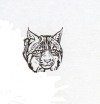
Other High Country And Wawona Related Pages
Where IS Yosemite?
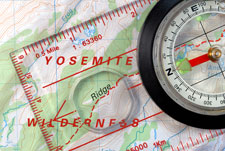
The Wawona Road
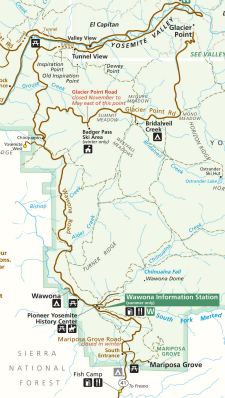
Yosemite's High Sierra Camps

Explore the Yosemite High Sierra Camps here!
The Story Of Fishing Yosemite
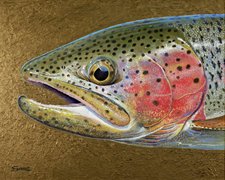
Explore Yosemite's High Country From Your Car
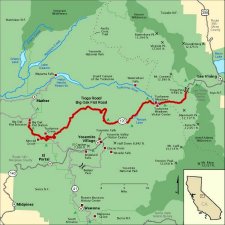
See Yosemite's High Country From Your Car
A Brief History Of The Tioga Road
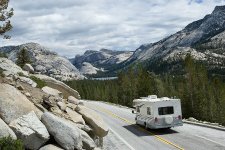
Building Yosemite's Tioga Road was a gargantuan task!
Other Things To See While In Wawona








